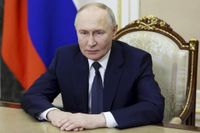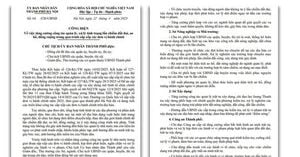Switzerland has taken significant steps to align its sanctions against Russia with those of the European Union, as announced by the State Secretariat for Economic Affairs (SECO). The new measures include a ban on Swiss companies advertising in eight additional Russian media organizations, reflecting the EU's 16th sanctions package and subsequent decisions that had not yet been adopted by Switzerland.
As part of this expansion, the list of 158 individuals and organizations under financial sanctions has also been amended. This move underscores Switzerland's commitment to supporting international efforts to curb the influence of Russian media amidst ongoing geopolitical tensions.
In a related development, the World Health Organization (WHO) has announced significant layoffs due to budget cuts resulting from a reduction in funding from the United States. WHO Director-General Tedros Adhanom Ghebreyesus highlighted the agency's financial difficulties, stating, "The sudden drop in income has left us with a large salary gap and no choice but to reduce the scale of our work and workforce." He noted that the cuts could affect approximately 25 percent of staff costs, although the exact number of job losses remains uncertain.
Meanwhile, Switzerland's economy shows signs of resilience. The International Monetary Fund (IMF) has projected a GDP growth of 0.9 percent for Switzerland, as confirmed by Economics Minister Guy Parmelin during meetings with Swiss businesses in the US. This growth prediction comes amid a backdrop of rising wages in the country. According to a study released by the Federal Statistical Office, wages in Switzerland increased by 1.8 percent in 2024, outpacing inflation by 1.1 percent.
This wage growth is notable, especially compared to the previous years, where increases were recorded at 1.7 percent in 2023 and 0.9 percent in 2022. The report indicated that employees in healthcare, residential care, and social work experienced the highest salary increases at 3 percent, while those in the insurance industry and public administration saw average wage growth of 2.5 percent. Additionally, the data revealed a positive trend in gender wage equality, with women's wages rising by an average of 2.6 percent compared to a 1.2 percent increase for men.
In the realm of technology and innovation, Switzerland continues to shine on the global stage. Zurich has once again been recognized as the smartest city in the world, according to the 2025 Smart City Index released by the IMD Business Institute in Lausanne. This marks the sixth consecutive year that Zurich has claimed the top spot. Geneva and Lausanne also made the list, securing third and tenth places, respectively.
The Smart City Index evaluates cities based on economic and technological aspects, alongside humane dimensions such as quality of life and inclusiveness. Zurich's consistent ranking highlights its commitment to innovation and sustainable urban development.
On the scientific front, the European Space Agency (ESA) successfully launched the ACES set of atomic clocks on April 21, 2025. This mission aims to measure the effect of gravity on the passage of time, showcasing Switzerland's contributions to cutting-edge research and technology.
In cultural news, Switzerland mourns the loss of esteemed Alemannic writer and former professor of German literature, Peter von Matt, who passed away on April 21, 2025, at the age of 87 after a prolonged illness. His contributions to literature and academia have left a lasting impact on Swiss culture.
In a ceremonial context, the swearing-in ceremony of the Pontifical Swiss Guard, typically held on May 6 each year, has been postponed following the death of Pope Francis. A new date for the ceremony will be announced in the autumn.
As Switzerland navigates these multifaceted developments—from international sanctions to economic growth and cultural losses—it remains a focal point of innovation and resilience in the face of global challenges.





